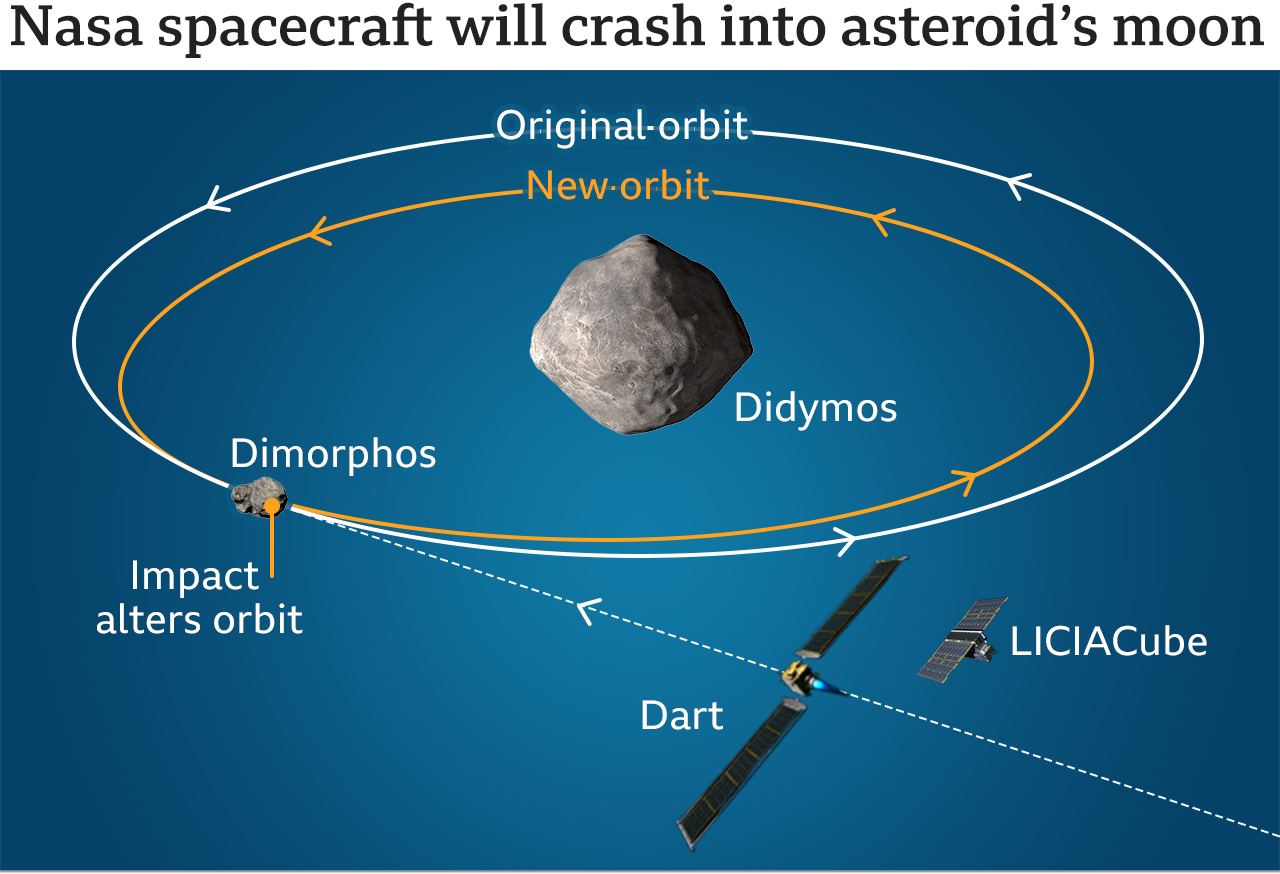Double Asteroid Redirection Test (DART) Mission: NASA | 26 Sep 2022
For Prelims: Double Asteroid Redirection Test, NASA, Asteroid Dimorphos, Kinetic Impactor Method of planetary defence.
For Mains: Double Asteroid Redirection Test Mission and its Significance.
Why in News?
The National Aeronautics and Space Administration (NASA) is about to launch its Double Asteroid Redirection Test (DART) mission.
What is the Launch?
- It is the first Kinetic Impactor Method of planetary defence, where a DART spacecraft will be colliding with the asteroid Dimorphos.
- The Kinetic Impactor Method involves sending one or more large, high-speed spacecraft into the path of an approaching near-earth object. This could deflect the asteroid into a different trajectory, steering it away from the Earth's orbital path.
- Data obtained from DART’s crash will be compared to the data from various computer simulations run by scientists to ascertain whether this kinetic impactor method will remain a viable option in case of an actual threatening asteroid.
- Scientists don’t yet know the exact mass of Dimorphos but it is estimated to be around five billion kilograms. The DART spacecraft weighs around 600 kilograms.
What is a DART mission?
- About:
- DART is a low-cost spacecraft.
- It has two solar arrays and uses hydrazine propellant for maneuvering the spacecraft.
- It also carries about 10 kg of xenon which will be used to demonstrate the agency’s new thrusters called NASA Evolutionary Xenon Thruster–Commercial (NEXT-C) in space.
- NEXT-C gridded ion thruster system provides a combination of performance and spacecraft integration capabilities that make it uniquely suited for deep space robotic missions.
- The spacecraft carries a high-resolution imager called Didymos Reconnaissance and Asteroid Camera for Optical Navigation (DRACO).
- Images from DRACO will be sent to Earth in real-time and will help study the impact site and surface of Dimorphos (the target asteroid).
- DART will also carry a small satellite or CubeSat named LICIACube (Light Italian CubeSat for Imaging of Asteroids).
- LICIACube is expected to capture images of the impact and the impact crater formed as a result of the collision.
- Objectives:
- The mission is to test the new technology to be prepared in case an asteroid heads towards Earth in the future.
- The aim is to test the newly developed technology that would allow a spacecraft to crash into an asteroid and change its course.
- The target of the spacecraft is a small moonlet called Dimorphos (Greek for “two forms”).
- Dimorphos orbits a larger asteroid named Didymos (Greek for “twin”).
- It is a suicide mission and the spacecraft will be completely destroyed.
What is the Reason for Choosing Dimorphos?
- The goal of the mission is to determine how much DART's impact alters the moonlet’s velocity in space by measuring the change in its orbit around Didymos.
- Scientists think the collision will change the speed of Dimorphos by a fraction of one percent.
- It should alter the moonlet's orbital period around the larger asteroid by several minutes – enough to be observed and measured by telescopes on Earth.
UPSC Civil Services Examination Previous Year Question (PYQ)
Q. What is ‘Greased Lightning-10 (GL-10)’, recently in the news? (2016)
(a) Electric plane tested by NASA
(b) Solar-powered two-seater aircraft designed by Japan
(c) Space observatory launched by China
(d) Reusable rocket designed by ISRO
Ans: (a)
Exp:
- Greased Lighting–10 (GL–10) is NASA developed battery-powered plane with 10 engines that can take off and land like a helicopter and fly efficiently like an aircraft.
- It is a remotely piloted plane having a 3.05 meter wingspan, eight electric motors on the wings, and two electric motors on the tail and weighs a maximum of 28.1 kilograms at take-off.
- Therefore, option (a) is the correct answer.

